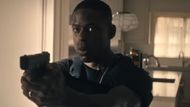The Hulu show Paradise earns praise for its twists. Fans replay big reveals and argue about suspects. Yet the loud shocks are not the real fear. The show plants dread in quiet places. It hides in small details that feel ordinary. They work slowly, then sit with you after the credits.
Let's go ahead and walk you through those hidden parts. You will see how quiet frames, small objects, and broken patterns turn the story cold.
Hidden moments in Paradise that make this Hulu mystery even more chilling

The power of still frames
The camera often waits one second longer than you expect in Paradise. It holds in an empty hall after a character leaves. It stares at a door left slightly open. Nothing moves. That extra beat invites your mind to fill the dark. In one scene, David checks every room in his flat. He finds nothing and shuts the bedroom door. The camera stays outside and looks at the closed door for five long seconds. The silence cuts deeper than any scream.
Sounds that strike
Tiny noises carry more fear than loud music. Footsteps echo too long in an empty warehouse. A refrigerator hums through a quiet night. A phone buzzes on a table, stops, then buzzes again. The mix pushes these sounds in front of dialogue. A character hides inside a closet. We don't see the killer in Paradise, only hear floorboards sigh in the hall. The sound design turns absence into a monster your mind draws on its own.
Windows and mirrors
Reflections often tell a second story. A face looks calm in the frame, yet the mirror shows a twitch. A tall figure appears in a window’s glare before it enters the room. You question which view is honest. Elena talks to her husband in their living room. She smiles. In the black television screen, her reflection does not smile, but looks terrified. The image lingers and grows colder the longer you think about it.

Shifts in light and color
Light can flip a mood in one breath. A warm room turns gray without a cut. Skin looks pale. Eyes look flat. A sweet radio tune plays under the scene, and the air chills. A dinner party begins with a sunset glow outside the window. Then the glow fades to a sharp blue. Laughter continues, but the space feels false. The shift in Paradise feels wrong to your eyes, so your gut tightens.
Unstable reality
The show breaks reality to keep you off balance. Time itself is not reliable. A wall clock reads 4:12. In the next shot, a character's watch shows 4:10. This small slip cracks the timeline. It makes every alibi feel weak. The physical world is just as untrustworthy. Objects move on their own between camera cuts. A full coffee cup becomes half empty. A napkin refolds itself. These are not filming errors. They are clues pointing to lost time or an unseen visitor. The world itself feels like a setup.
Hidden habits in body language
People often reveal stories through their mannerisms. A man taps his ring before he lies. A woman rubs an old scar when a memory burns. A detective takes one deep breath before a hard choice. You learn these patterns over time. Then the pattern stops at a key moment. The man prepares to lie, yet his hand stays still. The silence in that missing tap is louder than words in Paradise.
Phone screens and missing details
Paradise gives you full, clear shots of phones. You see the text threads. You notice no contact photo for the sender. A gap sits in the chain where a message should be. The typing dots flash, then vanish. You start to read the phone like a case file. You find a call log with ten calls from “Unknown Number.” The character stays calm and sets the phone down. That calm feels scarier than the calls.

Faces in the background
Extras return like a pattern. A woman in a red coat crosses the street in two episodes. A cyclist waits at the same corner in scenes set miles apart. A barista glances at a note, then hands the wrong cup to the wrong person. These repeats make the town feel staged and watched. The world feels like a loop. The main cast of Paradise looks trapped inside someone else’s plan.
The truth indoors
Doors confess. A sticky front door slides open without a sound one night. A deadbolt sits at a new angle. A chain that used to rest tight hangs loose. These are small shifts, yet they say someone entered. A safe house turns into a set. Every creak now sounds like intent. Paradise characters miss these changes. You do not.
Pauses in speech
Paradise uses silence to convey meaning. It makes unspoken moments important. A character's hesitation before answering a question shows deception. For example, a husband is asked about his location. His delay before speaking carries more weight than his actual words. This silence immediately undermines his honesty. The audience senses the lie during the pause.
Weather out of place
The show makes you feel uneasy by using strange weather. The outside world often does not match how the characters feel. For instance, a happy memory might show rain falling despite the clear sky. A calm talk might happen while a cold, strong wind blows. This mix-up makes the show's world feel wrong. It puts a scary feeling into scenes that should be peaceful. It shows that no place is truly safe.

Haunting patterns
Paradise uses repeating clues to build its chilling story. Random details become important over time. Small objects return with new meaning. A blue scarf appears on a train in one episode. It later shows up in an evidence box as a clue to a murder. Numbers repeat in the same way. We see the number 214 on an apartment door. Then we see it on a license plate and a key tag.
These links lead to different places. Sound creates a pattern, too. A child hums a short tune in a park. A music box in an old house plays the same tune later. The melody connects innocence to a dangerous place. These patterns show that every detail is planned.
Words in the background
Printed text becomes its own voice in Paradise. Posters, coffee mugs, and school notices line up too neatly with the scene. A man feels trapped at his desk. Behind him, a poster sells steel cages. The match feels wrong and perfect at the same time. The world itself seems to speak back, which adds a quiet chill.
Fear from off-screen space
Some threats catch you off guard: a voice calls a name from a room we never see, a car engine idles outside for a full minute without a driver shown, a yellow light glows under a basement door that never opens. Your mind paints the rest, and your picture is worse than any reveal.

The false sense of safety
The show's ending leaves you feeling worried, not relieved. As the final credits roll, a soft, familiar sound returns. It is the buzz of a phone vibrating, the sound heard in the first episode. This sound reminds you that the danger is not gone. The show does not give a clear ending. It suggests the scary events will happen again, like a cycle.
Why these small things matter
Paradise scares you with ordinary life turned slightly wrong. It invites you to take part, then rewards careful eyes. You leave the screen and walk to your kitchen, look at your clock, and catch a tiny scrape on the floor that you never noticed. Your heart picks up by one beat.
